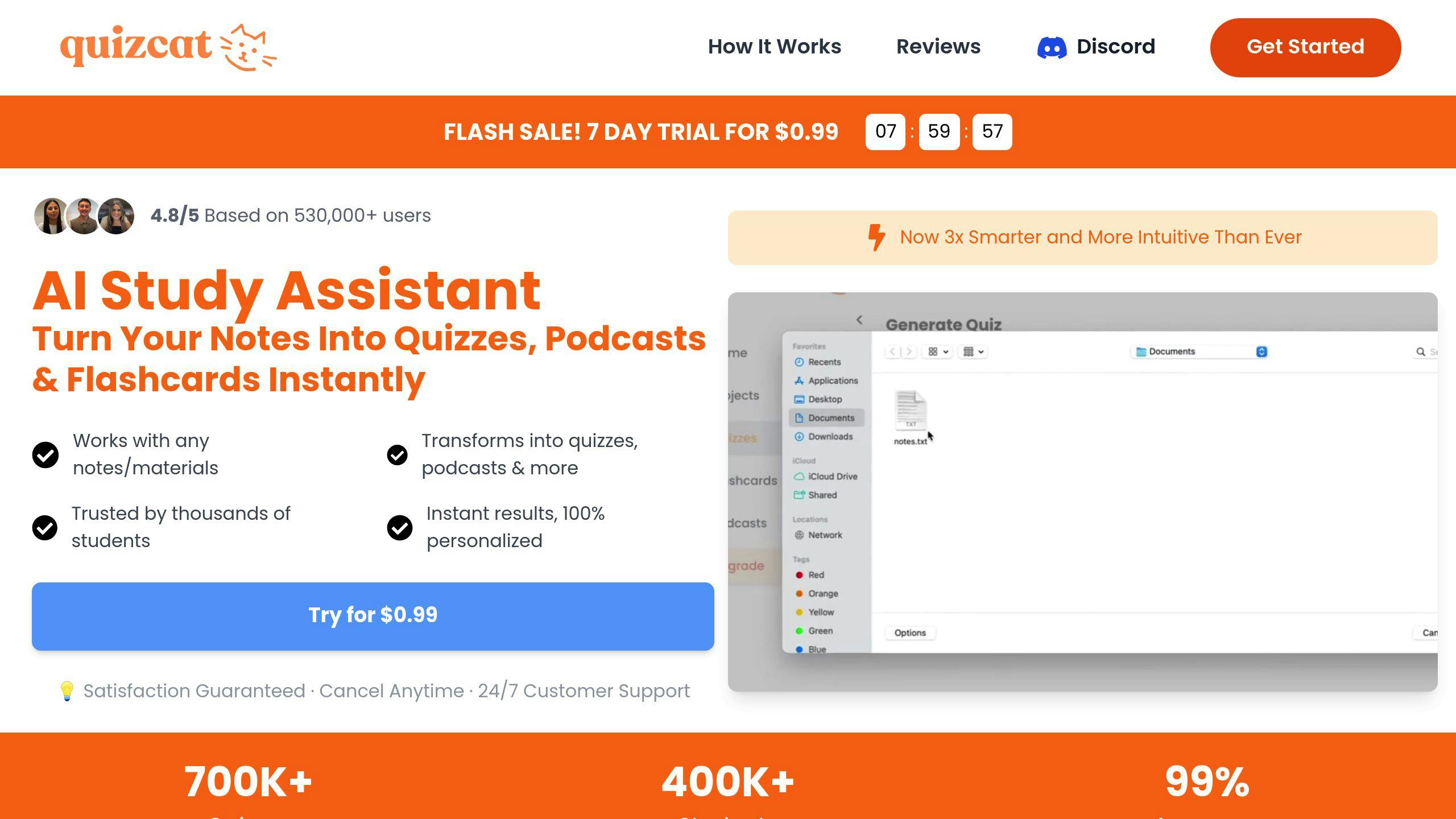
Why Version Control Matters for Students
Version control can save you time, reduce stress, and make managing academic work much easier. Whether you're juggling multiple essay drafts, collaborating on group projects, or working on long-term research, version control tools keep everything organized and track every change you make. Here's why it matters:
- Track Changes: Easily review edits, revert to earlier versions, and avoid confusing file names like "Essay_Final_FINAL2.docx."
- Collaborate Efficiently: Work with teammates without overwriting each other's contributions or losing progress.
- Recover Mistakes: Roll back to previous versions if something goes wrong.
- Prepare for the Future: Learn skills that are essential in professional environments.
Tools like GitHub, Google Drive, and LabArchives simplify this process and are widely used in academic and workplace settings. Pairing version control with tools like QuizCat AI can even turn your organized materials into effective study aids. Start using version control today to stay organized and focused on what really matters - your work.
What is Version Control? Explained In 4 Minutes
Understanding Version Control and Its Importance
Version control isn't just about saving files - it's a methodical way to track and manage changes in documents over time. For students, it acts as a digital safety net, capturing every edit, addition, or deletion made to their academic work.
Version Control Basics
Version control keeps a detailed history of your work while making collaboration easier. It goes beyond basic file backups by offering a full record of changes and allowing multiple users to work on the same project simultaneously.
Here are some key features and how they benefit students:
| Feature | How It Helps Students |
|---|---|
| Change Tracking | Logs every edit with timestamps and author information |
| Branching | Lets you test ideas without affecting the main document |
| Rollback Options | Allows you to restore earlier versions if needed |
| Merge Capabilities | Combines edits from multiple contributors into one file |
Benefits for Students
Using version control can completely change how students handle academic projects. At Harvard, researchers have pointed out its role in safeguarding data integrity, especially in fields like biomedical studies [1]. It enhances collaboration, reduces the risk of data loss, and helps avoid errors, making it a must-have tool for academic work.
With version control, students can try out new ideas without worrying about losing their original content. This ability to explore freely encourages creative thinking and leads to better academic achievements.
Applications in Academic Settings
Version control is incredibly useful in academic environments. Universities rely on these tools to make teamwork smoother and ensure consistent documentation for class projects and research. Common uses include coding assignments, group writing projects, and managing research data [3].
For research teams, version control ensures everyone is working with the most up-to-date information and can track how their findings develop over time. This transparency becomes especially important when preparing papers for publication or presenting results.
These examples show how version control not only simplifies academic tasks but also encourages collaboration and creative problem-solving, giving students an edge in their studies.
Problems Without Version Control
Skipping version control can create major headaches, especially in team projects and academic work.
Collaboration Issues
When teams don’t use version control, chaos often follows. File versions get mixed up, changes overwrite each other, and team members struggle to keep track of who did what. Manual merging becomes a time sink, and important contributions can be lost. Imagine several people editing the same document at once - conflicting changes are almost guaranteed [2]. Untangling those conflicts takes time and effort that could be better spent elsewhere.
Effects on Academic Work
In academic settings, the lack of version control can derail progress. Students risk losing data, missing deadlines, and turning in lower-quality work [1]. Research becomes harder to validate because tracking changes and documenting progress accurately is nearly impossible [3].
Group projects, research papers, and long-term assignments are particularly vulnerable. Without proper tools, students often face higher stress and lower productivity. Instead of diving into the actual work, they spend hours juggling file versions and tracking edits manually [1]. It’s a frustrating distraction from learning and creating.
These challenges highlight why version control tools are so crucial - something we’ll dive into in the next section.
sbb-itb-1e479da
Starting with Version Control
Common Version Control Tools
Version control doesn't have to be overwhelming. Harvard University points to several easy-to-use platforms that are particularly suited for academic work [1].
- GitHub: Perfect for programming and technical projects, offering features like branching and merging to manage changes effectively.
- Google Drive: Great for collaborative document editing, allowing multiple users to work on files simultaneously.
- LabArchives: Tailored for research, providing tools designed for managing research data and secure version tracking [3].
Effective Version Control Practices
After selecting a version control tool, it's important to follow some key practices to get the most out of it. The University of Wisconsin-Madison suggests starting with clear workflows to keep everything organized [3].
- Use descriptive file names like
Thesis_v2.docto quickly identify versions. - Commit small, frequent updates to make tracking changes and recovering files easier.
- Store files both locally and in the cloud to protect against data loss [2].
- For team projects, assign clear roles and take advantage of branching features to work on different parts of the project. Merge changes systematically to maintain a clean workflow [2].
These tools and strategies not only make file management easier but also improve teamwork and academic efficiency. Pairing these methods with tools like QuizCat AI can further streamline your academic tasks.
Using QuizCat AI with Version Control

QuizCat AI Features
QuizCat AI works hand-in-hand with version control to turn organized, updated materials into effective study tools. This boosts learning retention and keeps students engaged.
Here’s what it offers:
- Automated Quiz Generation: Quickly create quizzes from version-controlled notes.
- Interactive Flashcards: Simplify concept review with AI-generated flashcards.
- On-the-Go Learning: Convert materials into podcasts for flexible study sessions.
When paired with version control systems, these tools streamline workflows and make studying more efficient.
Combining QuizCat AI and Version Control
By storing study materials in systems like GitHub or Google Drive, students can ensure their content is always current and ready for QuizCat AI to process.
Here’s how this integration works:
| Workflow Step | Version Control Role | QuizCat AI Integration |
|---|---|---|
| Content Creation | Tracks updates and changes | Creates study aids from the latest content |
| Team Projects | Manages edits across collaborators | Builds shared quizzes for group study |
| Exam Preparation | Organizes and stores materials | Generates personalized review tools |
For group work, version control helps team members track updates, while QuizCat AI turns shared content into collaborative study resources.
"The combination of QuizCat AI and version control can support students in achieving better academic outcomes by providing them with organized, up-to-date study materials and engaging study tools that help them review key concepts, test their knowledge, and focus on areas that need improvement." [2]
To make the most of this system, students should:
- Save their materials in version control systems.
- Regularly update QuizCat AI with the latest content.
- Use analytics to track understanding and monitor material changes.
This setup is especially useful for long-term projects or preparing for comprehensive exams, where managing materials and effective study methods are critical.
Conclusion
Version control has become a game-changer for students, reshaping how they handle academic projects, collaborate with peers, and ensure data accuracy. Tools like Git and GitHub provide a secure way to experiment without the fear of losing work. According to Harvard's research, the role of version control in education continues to grow [1].
When paired with platforms like QuizCat AI, version control offers a powerful way to stay organized and focus on learning instead of juggling files. Studies highlight how these tools enhance teamwork and improve project results [2].
Starting with version control early helps students develop skills that go far beyond the classroom. Tracking changes, working effectively in teams, and safeguarding project integrity are valuable abilities, especially in research settings where accuracy and collaboration are critical [3].
In a world where digital literacy and teamwork are increasingly emphasized, mastering version control equips students to tackle both academic and future professional challenges. As universities prioritize these competencies, students who adopt these tools gain a clear edge in their academic and career pursuits [2].
